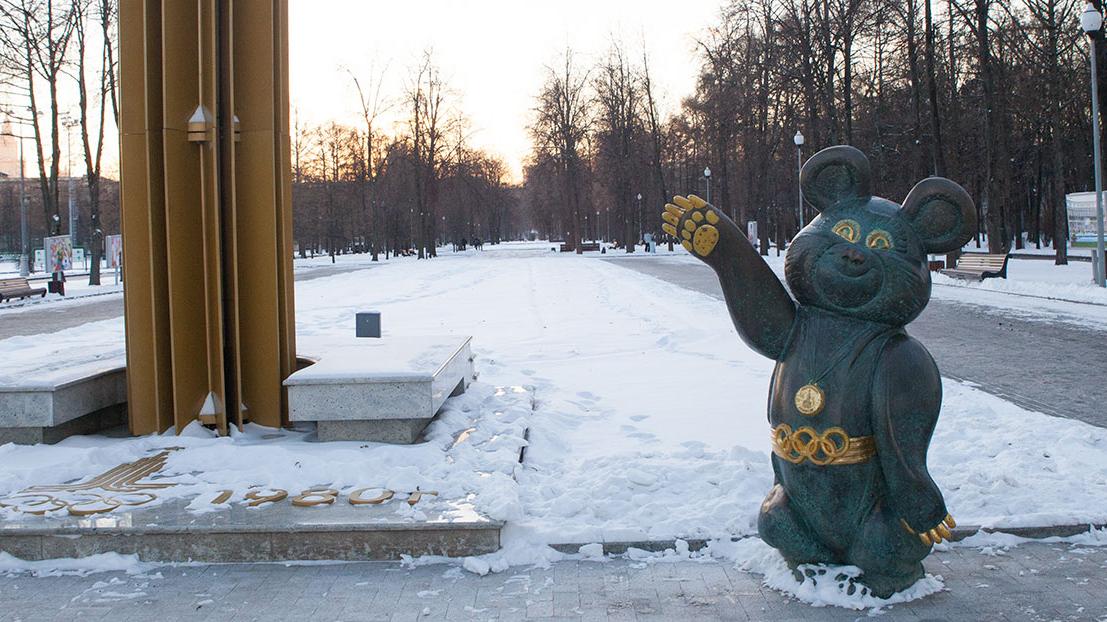Olympic Mishka statue.
People often say Russia hasn’t hosted the Olympics since 1980. But, of course, the country that actually hosted those Olympics was the USSR, and it’s a huge distinction.
And the Cold War overshadowed that event as the US led a boycott of the Moscow Olympics to protest the Soviet invasion of Afghanistan. It was a controversial decision, both in terms of politics and the price paid by athletes who’d trained so long to compete.
That controversy, plus the fact that US media provided only muted coverage of the 1980 Games, means that they play only a hazy role in the memories of many people.
Not so for citizens of the former Soviet Union old enough to remember 1980. You can bring up the Moscow Olympics with almost anyone of my generation and get a strong reaction, sometimes involving tears or at least a rueful smile.
Yury Saprykin edits the online cultural review “Afisha Air” in Moscow. In 1980, he was a 7-year-old boy glued to cartoons on the family TV set.
In the run-up to the Olympics, they showed Baba Yaga, the witch of Russian fairy tales, plotting to stop Mishka, the Olympic mascot, from getting to the Games.
oembed://https%3A//www.youtube.com/watch%3Fv%3DEe3beFc3oA4
It was through cartoons like these, and the cheerfully oblivious figure of Mishka, that the Olympic idea captivated young Yury.
“All the Soviet cultural machine worked for the kids,” he says. “So for me, the Olympic Games [looked like] one of the cultural projects for kids.”
Saprykin grew up outside Moscow, so his link to the Games was the same as for most of the sprawling USSR, via TV.
He remembers the family TV broke down a week before the start, and he was devastated. But fortunately, they found a way to get the TV repaired. And he was transfixed by the competitions.
Apart from Baba Yaga’s failed attempts, Saprykin doesn’t remember the US boycott at all.
“The TV channels tried to find a good example of the sportsmen who [were] boycotting the boycott” and attended the Games despite pressure from their governments, such as British runner Sebastian Coe.
Beyond that, Saprykin says, “In 1980, there was a really strong reason for a boycott. It was [the] invasion of Afghanistan. And I think, maybe not me, but the adults understood it very well. So I don’t remember any hostile feelings for Americans.”
Ordinary Soviets just welcomed the chance for foreign visitors — and some of the epic changes they brought. Authorities cleared out Moscow of all “undesirables” and filled shelves with rarely-seen luxuries, like Pepsi and Marlboro cigarettes.
More importantly, Saprykin says, “It was so strange and beautiful to see completely different people [who didn’t] look like us, from another side of the Iron Curtain, and to have them in your city, near you.”
But after a few weeks, it all came to an end. The closing ceremony of the 1980 Olympics is seared on Saprykin’s brain. At the end, a huge, inflated rubber Mishka emerged in the stadium and waved to the crowd as a bittersweet goodbye song played. And then, lifted by balloons, he flew away.
oembed://https%3A//www.youtube.com/watch%3Fv%3D7EK5N-FbSEc
“For people a little bit younger than Putin’s generation like me, this Mishka flying away, it’s like a symbol of the end of the Soviet Union, collapse of the Soviet Union. Because it was like a prophecy that something good … connected to your childhood would fly away and everybody would [be] in tears, but you cannot do [anything],” Saprykin says.
So if Mishka had just stayed tethered to the ground, perhaps all the subsequent history— the end of the USSR and the Cold War, Russia’s resurgence and need to host the most expensive Winter Games in history — none of this might have happened?
Saprykin laughs. “Maybe!"
